Mary Anne Yarde's Blog: The Coffee Pot Book Club , page 125
August 25, 2019
Join #historicalmystery author, Heather Redmond, as she takes a look at the life of Charles Dickens #History #Dickens @HeatherARedmond
In the Time of Charles DickensBy Heather Redmond
Charles Dickens was born near Portsmouth, England in 1812 and died suddenly in Kent, England in 1870. He is considered a preeminent Victorian, and is the bestselling author of the age, but in fact, died only about halfway through Queen Victoria’s long reign. While he certainly had a lot to do with forming the opinions of his fellow man and the attitudes of the era, he wasn’t really considered a Victorian-style man during his lifetime.
For instance, he was a dandy, and had coarser manners than became common in the reticent post-Regency age. Dickens was, after all, born during the Regency, and his personal style reflected his coming of age in those earlier times.
 Charles Dickens.
Charles Dickens.I am concerned with Dickens in his early twenties for my A Dickens of a Crime series. This was the age of William IV, who reigned from 1830 to 1837. Of course, this is a period that has no official title. It’s between the Regency and the Victorian eras and tends to be neglected. But yes, there was an entirely different king for seven years between the Prince Regent, who reigned as George IV when his mad father finally died, and when Queen Victoria came to the throne at eighteen.
It’s hard for us to imagine her as a young ingénue. We think of her as that sad, overweight widow. But in her youth, men like Dickens professed themselves to be in love with her at dinner parties. Queen Victoria, raised very quietly by her twice-widowed mother, did not like the licentious behavior of her uncles. The attitudes of the court changed quickly when she took the throne, and she married Prince Albert in February 1840. They soon started having children, creating a happy family image for the throne. The Victorian era was born.
A man with a public life like Dickens was very aware of his image. He had married at twenty-three, and quickly had children as well. He knew, especially post his publication of A Christmas Carol in 1843, that he was known as a family man, and his entire career was based that. This led him to become very secretive in the 1850s as his home life fell apart. The Victorian age expected their “Great Men” to toe the line, and it was easier to hide the truth of bad behavior before the age of social media!
His secrets didn’t only include a teenaged mistress. It's hard to imagine someone like Dickens could produce his glorious novels with so little education. In fact, he hid the truth of his interrupted school life. In his era, there was a much higher expectation of privacy. A man’s home was considered his castle. With the police force not forming until 1829, and civil registration for births, deaths, and marriages not legislated until 1837, there were not a lot of government entities interfering in a man’s domestic concerns.
Even Dickens’s own wife was unaware of his actual background of being pulled out of school at age ten after a few years as an excellent scholar, then being left to roam London until he was forced by his family to work in a blacking factory for around a year when he was twelve. After his family recovered their finances, he was sent back to school for a couple of years, but then entered the workforce at fifteen.
He came to novel writing slowly. First he worked as a law clerk, clerking being a huge job category before computers, and for many, many years, contemplated becoming a lawyer. But he had relatives in the newspaper business, and he and his father learned the complicated shorthand that was needed to be a parliamentary reporter. Dickens became the best in the business in this second career, reporting for top liberal newspapers while publishing short stories (initially for free) on the side. This was a high paying job back then (before the Internet.) He also became known for his sketches of modern life, which were collected in book form in 1836. Opportunities began to come his way, and celebrity came very quickly after that. Networking was of paramount importance in building his career, then as it is now.
 Cheapside, London
Cheapside, LondonCharles Dickens was the first international literary celebrity. He had both a very unusual life, and one that matched the style of the time in which he lived in its separation between private and public lives that is hard to find in the modern era.
Grave ExpectationsBy Heather Redmond

In this clever reimagining of Charles Dickens’s life, he and fiancée Kate Hogarth must solve the murder of a spinster wearing a wedding gown...
London, June 1835: In the interest of being a good neighbor, Charles checks in on Miss Haverstock, the elderly spinster who resides in the flat above his. But as the young journalist and his fiancée Kate ascend the stairs, they are assaulted by the unmistakable smell of death. Upon entering the woman’s quarters, they find her decomposing corpse propped up, adorned in a faded gown that looks like it could have been her wedding dress, had she been married. A murderer has set the stage. But to what purpose?As news of an escaped convict from Coldbath Fields reaches the couple, Charles reasonably expects the prisoner, Ned Blood, may be responsible. But Kate suspects more personal motives, given the time and effort in dressing the victim. When a local blacksmith is found with cut manacles in his shop and arrested, his distraught wife begs Charles and Kate to help. At the inquest, they are surprised to meet Miss Haverstock’s cold and haughty foster daughter, shadowed by her miserably besotted companion. Secrets shrouded by the old woman’s past may hold the answers to this web of mystery. But Charles and Kate will have to risk their lives to unveil the truth . . .
Pick up your copy ofGrave ExpectationsHERE!
Heather Redmond
 Crime writer Heather Redmond is a committed anglophile, Dickens devotee, and lover of all things nineteenth century. She writes two mystery series, A Dickens of A Crime, featuring young Charles Dickens in the 1830s, and a new cozy mystery series set in Seattle which debuts in fall 2019.
Crime writer Heather Redmond is a committed anglophile, Dickens devotee, and lover of all things nineteenth century. She writes two mystery series, A Dickens of A Crime, featuring young Charles Dickens in the 1830s, and a new cozy mystery series set in Seattle which debuts in fall 2019. Connect with Heather: Website • Twitter.
Published on August 25, 2019 21:00
August 23, 2019
#BookReview — The Center of Gravity by Patricia Brandon #WW2 #HistoricalFiction @pgaddisbrandon

The Center of GravityBy Patricia Brandon

A young woman is tricked into service as a food tester for Adolf Hitler in his secret Wolf's Lair, where she will endure yet another atrocity. A French professor, whose best friend is a Jew fighting in the Alsatian Resistance, is forced to assist in the Nazi reconstruction of the priceless Amber Room in the Konigsberg Castle. All hide dangerous secrets. When their worlds collide, high risk plans for escape are made, with the unlikely help of the anti-Nazi brother of Hermann Goering. But will the darkest of secrets remain hidden, or will lives be forever changed when the truth is finally revealed?

"Evil often initially masquerades as gray, not black and white..."
Germany would be a great nation now that Adolf Hitler was at the helm. Look how successful the Olympische Sommerspiele of '36 had been, and that was only the start.
The signs had been there, of course. Sonne Becker's father had seen them, but even he did not know how far the Nazis were willing to go to achieve their aims.
Rainer von Bauchelle and Josef Taffel had been friends for as long as they could remember. Nothing could change that. Nothing. Not even the Nazis as they marched into Alsace, France and spread their propaganda of hatred and division. But while Josef, a Jew, joins the Alsatian Resistance, Rainer must play a different type of game. He is forced to befriend the enemy, work with them. He does not want to. But, he has no choice.
Hitler had blue eyes. Sonne Becker had always thought them black, like his soul. But no. They were blue. She would never forget the colour of his eyes, or what that chance meeting would mean for her. Sonne's life was no longer her own, and nor it seemed, was her body.
From the early days of Hitler's chancellorship to the devastating consequences of the Second World War and beyond, The Center of Gravity by Patricia Brandon is the gripping yet harrowing account of two lives torn unmercifully apart by the Nazi Regime.
Brandon has penned a deeply moving story of betrayal, deceit, sacrifice, and loss. This emotionally charged story paints a graphic portrait of what life was like for those who found themselves as disposable pawns in a game they never asked to play in the first place. Sonne experiences the horrors of Hitler's Wolf's Lair, whereas Rainer has to pretend to be submissive when he really wants to shout out his hatred. But along the way, both Sonne and Rainer discover that even in the darkest of moments, there is a reason to hope. For help can come from the strangest and most unlikeliest of places — an SS Officer, and the brother of Hermann Göring.
Sonne's struggle for survival haunts me. Brandon has taken a woman with so much promise, with youth on her side, and placed her in a situation where she cannot save herself nor can she fight. Her fears and her struggle for survival was incredibly moving. But her suffering does not end when the war does, nor does it end after the Nuremberg Trials. What happened to her affects her for the rest of her life. I found myself in tears on more than one occasion.
Rainer's war is a little different from Sonne's. He is recruited by the Nazis to recreate the Amber Room in Konigsberg Castle. His acts of defiance are small — unbeknown to anyone he wears the Star of David, a gift from Josef. But he soon comes to realise that not everyone who raises their hand and greets with a "Heil Hitler" is as loyal to the Party as they seem to be. I thought Rainer's character was masterfully portrayed.
There are several supporting characters in this book, but I thought the portrayal of Albert Göring was sublime. Albert is one of those unsung heroes of World War II. Unlike his brother, Albert was not seduced by the Party — in fact, he despised it. Albert saw through the parades and the banners and the slogans. He saw the Nazi Party for what they were. Albert was vehemently opposed to Nazism, and he did everything he could to help Jews and others who were persecuted escape. Albert has been shoved into obscurity by the depravity of his brother's crimes, so it was wonderful to read a book that celebrated his achievements. Kudos, Ms Brandon.
The historical detailing has to be commended. I have tutored Modern European History for a number of years, and the rise of the National Socialist German Workers' Party has always been somewhat of a speciality. Brandon has paid very close attention to the historical sources and eye witness accounts. I thought her portrayal of Wolf's Lair and the plight of Hitler's food-tasters was fabulous. The story of these 15 women who were forced to test Hitler's food before it was considered safe for him to consume is not something that is often discussed. But these women faced death every day, and the emotional damage must have been horrendous. Brandon has shown this in all its horrific detail.
I thought this was an absolutely fabulous book, and there is a surprising twist at the end, which I didn't see coming. Fans of tautly gripping World War II fiction will undoubtedly enjoy The Center of Gravity.
I Highly Recommend.
Review by Mary Anne Yarde.The Coffee Pot Book Club.
Pick up your copy ofThe Center of GravityAmazon UK • Amazon US
Patricia Brandon
 Patricia Brandon is a winner of a Carrie McCray Memorial Literary Award and the author of In The Valley Of Achor, her poignant, gritty, and inspirational story of her first year after facing sudden paralysis of her legs. She no longer plays tennis (yet!), but is writing, working on guitar and mountain dulcimer skills, and traveling with friends when she can. She hasn’t given up in the fight to regain her ability to walk!
Patricia Brandon is a winner of a Carrie McCray Memorial Literary Award and the author of In The Valley Of Achor, her poignant, gritty, and inspirational story of her first year after facing sudden paralysis of her legs. She no longer plays tennis (yet!), but is writing, working on guitar and mountain dulcimer skills, and traveling with friends when she can. She hasn’t given up in the fight to regain her ability to walk!Connect with Patricia: Website • Facebook • Twitter.
Published on August 23, 2019 21:00
#BookReview — The Final Reckoning (The Shadow of the Raven: Book 3) by Chris Bishop #HistoricalFiction #AngloSaxon @CBishop_author

The Final ReckoningThe Shadow of the Raven: Book 3 By Chris Bishop

Despite Alfred's great victory at Edington, Wessex is far from secure.
With the threat of an imminent Viking attack, Matthew, now a warrior, is sent to fortify and defend the ford at Leatherhead. There, hopelessly outnumbered, he faces his sternest test as he and a small band of barely trained Saxon warriors strive to hold out long enough for help to arrive or resolve to die trying.
In a time ravaged by political uncertainty, Matthew is placed in intense personal danger as he is also ordered to investigate the tyranny of the Ealdorman's stepson and dispense justice as he sees fit.
With his life still threatened by the wound to his chest, what is asked of him seems more than any man should endure as he faces . . . The Final Reckoning.

"You once told me you had no plans to invade Wessex, yet here you are..."
Alfred defeated Guthrum at Edington, and a treaty of peace was signed, but such a treaty did not neutralise the threat of another Danish invasion. This was not the time for complacently. The Vikings would try their luck again, Alfred is sure of it.
Alfred sends Matthew, The Warrior With The Pierced Heart, to Leatherhead to fortify the ford against invasion. What Matthew finds is an Earldorman who is controlled by his vile, treacherous and exploitative step-son, Oeric. Matthew must use all his wit, knowledge and skill to make Leatherhead ready despite Oeric. But as the Viking army marches ever closer, Matthew realises that they are hopelessly outnumbered.
Can The Warrior With A Pierced Heart, the man who it is said came back from the dead, win the day, or will the prophecy once told by a Celtic healer come to pass?
Vicious. Violent. Vivid. Victorious. The Final Reckoning: Book #3 in The Shadow of the Raven series by Chris Bishop is the hotly anticipated final chapter of the story of Matthew, the third born son of Lord Edwulf. Not only is this series shamelessly captivating, but the climax of this story was both spectacular and surprising — I should have seen it coming, but I didn't! The ending certainly caught me unawares.
As with the other two books, The Final Reckoning is told in the first person and by Matthew's perspective. The effect of this was, as a reader, we have an intimate knowledge of not only Matthew's thoughts but an understanding of his hopes and dreams, his loyalties and commitments, and his desperate struggle with who he is, what he has seen, and what he has done. He has made mistakes — trusted where he should not — and he is a wiser person because of it. Matthew is undoubtedly more careful in this book with regards to who he trusts and, more importantly, who he doesn't. He understands very well the treachery within other men's hearts, as well as their hopes and dreams. Matthew is a character that started out in this series as a very naive young novice monk, but by the end of this book, he is a man who others will follow willingly into battle.
There are some wonderful and not so wonderful supporting characters in The Final Reckoning, in particular, Matthew's dear friend, Aelred. I adored Aelred. He says it as it is and he isn't cowed by those of a higher position than himself. He is undoubtedly the kind of man you would want by your side in a fight! In comparison to Aelred is Oeric who is as much of a villain in this tale as Lord Hakon. Bishop is very good at creating larger than life characters, and the narrative simply swept me away. This is a book that you can certainly lose yourself in. If you love Michael Hirst's fabulous Vikings, then I think you will find something very appealing about Bishop's Shadow of the Raven series.
I have to commend Bishop's fascinating interpretation of historical events. Researching the Dark Ages is notoriously tricky, due to an unfortunate lack of primary sources, but Bishop does not let this thwart him. Bishop has obviously spent many hours researching to the best of any historian's abilities the reign of Alfred the Great and indeed Guthrum. The instability, the constant threat, the raids, the slavers, the harshness of this foreign land as well as its beauty has been vividly brought back to life. I loved it!
The Shadow of the Raven series reads like a great Dark Age saga. It is absolutely brilliant. Everything about this book, and this series, is exquisite — a reader's dream come true.
Each book in The Shadow of the Raven series stands alone, yet they also transition nicely — picking up where the last book left off. The Shadow of the Raven is a series a reader can most certainly get excited about reading.
I Highly Recommend.
Review by Mary Anne Yarde.The Coffee Pot Book Club
Pick up your copy ofThe Final ReckoningAmazon UK • Amazon US
Chris Bishop
 Chris Bishop was born in London in 1951. After a successful career as a Chartered Surveyor, he retired to concentrate on writing, combining this with his lifelong interest in history. His first Novel, Blood and Destiny, was published in 2017 and his second, The Warrior with the Pierced Heart was released in July 2018. Both form part of a series entitled The Shadow of the Raven.
Chris Bishop was born in London in 1951. After a successful career as a Chartered Surveyor, he retired to concentrate on writing, combining this with his lifelong interest in history. His first Novel, Blood and Destiny, was published in 2017 and his second, The Warrior with the Pierced Heart was released in July 2018. Both form part of a series entitled The Shadow of the Raven.Chris is a member of the Historical Writers’ Association as well as the Historical Novel Society.
Connect with Chris: Website • Blog • Twitter • Goodreads.
Published on August 23, 2019 20:00
August 22, 2019
Check out #Historical Fiction author, Brian Kitchen's, fabulous series — Divided Empire #AncientRome @Oldbrookender
Divided EmpireBy Brian Kitchen
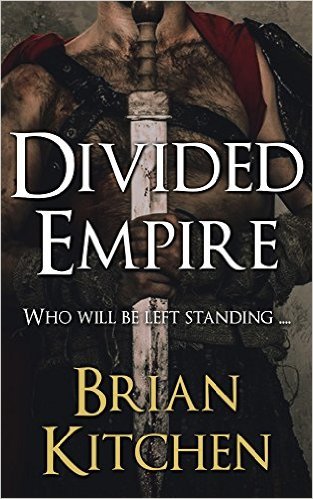
Britain, 391 AD.
The geographical, political and social outlines of the annexed nation are being constantly redefined, as the battling powers in Rome attempt to seize control of the Empire.
Flavius Vitulasius and his trusted associate, Siward, are journeying to receive a highly confidential mission, across the narrow sea, from the Master of Offices in Gaul.
On their path, they stumble upon a seeming damsel in distress, her carriage under attack from bandits. Using all their prowess and experience, Flavius and Siward rescue the damsel from certain death. Nevertheless, the beautiful young lady, Corellia Velva, is not as she seems.
When Corellia slips away the following night, Flavius thinks nothing of it. He has orders passed down from the Emperor himself to attend to. A document, the ‘Pagan Concord’, threatens to pull apart Britain at the seams, creating the lurking fear of civil war between the Christians and Pagans.
If Flavius and Siward can recover the ‘Pagan Concord’, they will be able to unmask the conspirators behind the unrest. With the help of an ardent Christian, Lucius Aurelius, the trio commence their enquiries in a clearly divided Britain.However, their expedition takes an unexpected turn when they visit the town of their first suspect. Once again, they come across Corellia. She fervently denies any knowledge of Flavius and Siward, suggesting that it is a case of mistaken identity, prompting suspicion from Flavius.
The disquiet among Pagans soon becomes clear, as ritualistic sacrifices and mysterious disappearances soon become the norm, while Flavius attempts to track down the ‘Pagan Concord’ and save the country of his origin. It is not long before he has some unwelcome attention, as murderous villains stalk his every move.
Can Flavius locate the document in time?
Is there more to Corellia than meets the eye?Can he escape the clutches of his murderous pursuers, and uncover a conspiracy that goes right to the top?
Divided Empire is a compelling piece of historical fiction. The first in the series, there is an unexpected twist around every action-packed corner.
Pick up you copy ofDivided EmpireAmazon US • Amazon UK
Dark Betrayal(Divided Empire Book 2)
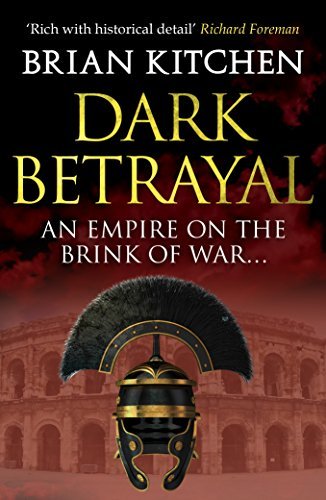
Britain, February 392 AD.
Flavius Vitulasius is at his father’s villa in Ad Trivonam when he receives a letter from his boss, Aulus, informing him of his latest mission.
Flavius is a former soldier who is now a Magistriani. He works with his friend Siward.
The Roman Empire is on the brink of civil war.
The Western Roman Emperor Valentinian has died in mysterious circumstance following a long running dispute with the commanding general of his army, Arbogastes, a Frank.
It is feared that Arbogastes has a candidate he will install on the Western throne as his puppet.
The Eastern Emperor Theodosius, fears that the Empire will once more be plunged into civil war. The war chest is depleted, and Theodosius needs the money to finance an army.
Previously Emperor Theodosius spared the lives of the usurper Magnus Maximus’ wife Elen and their two children when he was overthrown.
Emperor Theodosius wants Flavius and Siward to find Elen. She might know what happened to the Silver Host, a treasure believed to have been hidden by Magnus and his men that can fund the looming civil war.
Joined by their friend Lucius, their mission takes Flavius and Siward throughout Britain and Segontium and across the sea to Hibernia in search of the Silver Host.
Yet an old enemy always seems one step ahead of them: the Saxon woman, Gunhilde, who is working for Arbogastes’ chief agent in Britain.
In Hibernia Flavius and his friends must infiltrate a dangerous court to free a man with vital information. However, what affect will their actions have in the perilous court of the High King?
Returning to Britain, Flavius, Lucius and Siward finally learn the truth about the Silver Host, but a more dangerous situation has now arisen.
The political situation is now on a knife edge.
Flavius, Siward and Lucius soon find out that those who they once thought of as friends will now betray them. A woman who was abandoned and abused as a child, and a group of women loyal to the Goddess, are now their biggest threat.
Rich with historical detail and intrigue, Dark Betrayal is an action adventure and a must for anyone interested in the time when Rome’s rule was threatened by political intrigue and barbarian uprisings.
Pick up your copy ofDark BetrayalAmazon US • Amazon UK
Brian Kitchen
 Brian Kitchen lives in Burton upon Trent, England and enjoys walking in the countryside, photography, reading, writing, visiting museums and historic sites & buildings and supporting Burton Albion. He first became interested in the history of Roman Britain as a child and loved the Eagle of the Ninth trilogy of novels by Rosemary Sutcliff. The first of the Flavius Vitulasius novels, Divided Empire is his first published novel.
Brian Kitchen lives in Burton upon Trent, England and enjoys walking in the countryside, photography, reading, writing, visiting museums and historic sites & buildings and supporting Burton Albion. He first became interested in the history of Roman Britain as a child and loved the Eagle of the Ninth trilogy of novels by Rosemary Sutcliff. The first of the Flavius Vitulasius novels, Divided Empire is his first published novel.Should you wish to know more about Flavius & his friends, please visit his website & Facebook page,
Published on August 22, 2019 20:00
August 21, 2019
The Sunday Times bestselling author, Anne O’Brien, is talking about Constance of York the heroine in her #NewRelease — A Tapestry of Treason @anne_obrien
Constance of YorkCousin of King Henry IVWas she Guilty of Treason?By Anne O’Brien
It is not often that we discover medieval women engaged directly in political conspiracy as serious as treason. Usually they leave that to their menfolk. But here's a dramatic event to disprove the rule that women sat quietly at home, praying and stitching and playing the lute.
Constance of York was not a quiet woman. Only daughter of Edmund of Langley, Duke of York, and thus first cousin to both Richard II and Henry IV, she was the key figure in the event.
It could have cost her her life.
In February 1405, Constance was involved in a plot to remove King Henry IV from the throne and replace him with the young Edmund Mortimer, Earl of March, who was confined in Windsor Castle with his younger brother. Constance took the leading role, setting up the escape, paying a locksmith for duplicate keys, and aiding and abetting the flight of the two young boys from the castle. What's more she rode across England with them towards the Welsh Marches where she planned to hand the Mortimer boys over to Owain Glyn Dwr, to be used in his Welsh uprising against King Henry.
Unfortunately for Constance, Henry was warned of the escape and she was caught in the act in the company of the Mortimer boys near Cheltenham. They were all escorted back to face Henry's wrath.
What would be the outcome for a female and a royal traitor, cousin to the King? Would the penalty be death? All the drama!
Constance was brought before the Royal Council to answer for her sins, with King Henry himself sitting in judgement. Rather than remain silent, or confessing to her obvious guilt, Constance put the blame on her brother Edward, Duke of York. He had instigated the plot, Constance merely following orders. Constance also said it was not the first time that her brother had planned to kill the King.
York denied it all, claiming (craftily) that he had knowledge of what Constance intended, that he had in fact warned the King so the plot could be stopped, but he had had no part in it.
And what did Constance do? She challenged her brother to a duel, personal combat, hoping that someone in the Council would take pity on her and volunteer to fight for her good name.
Oh, to be a fly on the wall of Westminster Hall on that occasion!
York was a man of considerable reputation as a jouster and hunter. Would any man challenge him? A young man called William Maidstone, probably in a fit of hero-worship, actually offered to become Constance's champion and fight for her. The challenge was issued. York accepted it. Swords were drawn. Until King Henry stepped in and called the farcical events to an end.
What happened to Constance? Did the King find her guilty? Did he imprison her or have his treacherous cousin executed? Did he believe her accusations levelled at her brother the Duke of York.
I could tell you but that would spoil the enjoyment. All is there to be revealed in A Tapestry of Treason, published in hardback and ebook on 22nd August 2019.
A Tapestry of Treason
By Anne O’Brien
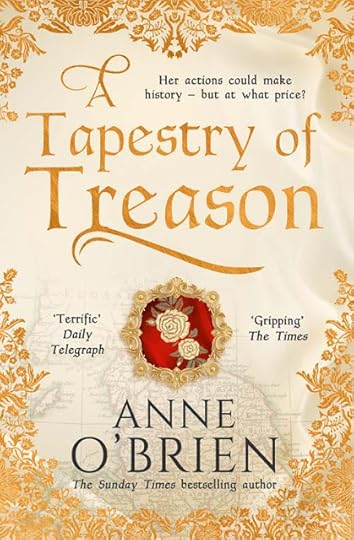
Her actions could make history – but at what price?
1399: Constance of York, Lady Despenser, proves herself more than a mere observer in the devious intrigues of her magnificently dysfunctional family, The House of York.
Surrounded by power-hungry men, including her aggressively self-centred husband Thomas and ruthless siblings Edward and Richard, Constance places herself at the heart of two treasonous plots against King Henry IV. Will it be possible for this Plantagenet family to safeguard its own political power by restoring either King Richard II to the throne, or the precarious Mortimer claimant?
Although the execution of these conspiracies will place them all in jeopardy, Constance is not deterred, even when the cost of her ambition threatens to overwhelm her. Even when it endangers her new-found happiness.
With treason, tragedy, heartbreak and betrayal, this is the story of a woman ahead of her time, fighting for herself and what she believes to be right in a world of men.
The Coffee Pot Book Club
★★★★★
Highly Recommended
Read the full review Here!

Pick up your copy of
A Tapestry of Treason
Amazon UK
Anne O’ Brien
 Anne O’Brien was born in West Yorkshire. After gaining a BA Honours degree in History at Manchester University and a Master’s in Education at Hull, she lived in East Yorkshire for many years as a teacher of history.She now lives with her husband in an eighteenth-century timber-framed cottage in the depths of the Welsh Marches in Herefordshire, on the borders between England and Wales, where she writes historical novels. The perfect place in which to bring medieval women back to life.
Anne O’Brien was born in West Yorkshire. After gaining a BA Honours degree in History at Manchester University and a Master’s in Education at Hull, she lived in East Yorkshire for many years as a teacher of history.She now lives with her husband in an eighteenth-century timber-framed cottage in the depths of the Welsh Marches in Herefordshire, on the borders between England and Wales, where she writes historical novels. The perfect place in which to bring medieval women back to life.Anne loves to hear from readers, you can find her: Website Facebook Twitter

<!-- /* Font Definitions */ @font-face {font-family:"Cambria Math"; panose-1:2 4 5 3 5 4 6 3 2 4; mso-font-charset:0; mso-generic-font-family:roman; mso-font-pitch:variable; mso-font-signature:-536870145 1107305727 0 0 415 0;} @font-face {font-family:Calibri; panose-1:2 15 5 2 2 2 4 3 2 4; mso-font-charset:0; mso-generic-font-family:swiss; mso-font-pitch:variable; mso-font-signature:-536859905 -1073732485 9 0 511 0;} @font-face {font-family:"Segoe UI Symbol"; panose-1:2 11 5 2 4 2 4 2 2 3; mso-font-charset:0; mso-generic-font-family:swiss; mso-font-pitch:variable; mso-font-signature:-2147483165 302055407 262144 0 1 0;} /* Style Definitions */ p.MsoNormal, li.MsoNormal, div.MsoNormal {mso-style-unhide:no; mso-style-qformat:yes; mso-style-parent:""; margin:0cm; margin-bottom:.0001pt; mso-pagination:widow-orphan; font-size:12.0pt; font-family:"Times New Roman",serif; mso-fareast-font-family:"Times New Roman";} a:link, span.MsoHyperlink {mso-style-priority:99; color:blue; text-decoration:underline; text-underline:single;} a:visited, span.MsoHyperlinkFollowed {mso-style-noshow:yes; mso-style-priority:99; color:purple; mso-themecolor:followedhyperlink; text-decoration:underline; text-underline:single;} .MsoChpDefault {mso-style-type:export-only; mso-default-props:yes; font-size:11.0pt; mso-ansi-font-size:11.0pt; mso-bidi-font-size:11.0pt; font-family:"Calibri",sans-serif; mso-ascii-font-family:Calibri; mso-ascii-theme-font:minor-latin; mso-fareast-font-family:Calibri; mso-fareast-theme-font:minor-latin; mso-hansi-font-family:Calibri; mso-hansi-theme-font:minor-latin; mso-bidi-font-family:"Times New Roman"; mso-bidi-theme-font:minor-bidi;} .MsoPapDefault {mso-style-type:export-only; margin-bottom:10.0pt; line-height:115%;} @page WordSection1 {size:595.3pt 841.9pt; margin:72.0pt 72.0pt 72.0pt 72.0pt; mso-header-margin:35.4pt; mso-footer-margin:35.4pt; mso-paper-source:0;} div.WordSection1 {page:WordSection1;} </style></div><br /><br /><br /><br />
Published on August 21, 2019 20:00
August 20, 2019
Who—and What—were the Lords Appellant? Find out with #Historical Fiction author, Mercedes Rochelle #History #Medieval @authorrochelle
Who—and What—were the Lords Appellant? By Mercedes Rochelle
 Arundel, Gloucester, Nottingham, Derby, and Warwick, Before the King Source: Wikimedia. When I first bumped into the Lords Appellant I was confused because as far as I knew, an appeal was filed after a court conviction in an attempt to reverse the decision. But as it turns out, in the fourteenth century an appeal was the starting point—an indictment or an accusation against someone, initiating a legal procedure. What made the case of the Lords Appellant so special was that this was the first time the appeal was introduced into Parliament; up until then, it was used in common and civil courts.
Arundel, Gloucester, Nottingham, Derby, and Warwick, Before the King Source: Wikimedia. When I first bumped into the Lords Appellant I was confused because as far as I knew, an appeal was filed after a court conviction in an attempt to reverse the decision. But as it turns out, in the fourteenth century an appeal was the starting point—an indictment or an accusation against someone, initiating a legal procedure. What made the case of the Lords Appellant so special was that this was the first time the appeal was introduced into Parliament; up until then, it was used in common and civil courts. When you see the words Lords Appellant capitalized, it refers to those involved in the first legal crisis of Richard II's reign. Their case was against Richard's friends, counselors, and officers who were accused of giving the king bad advice—misleading and deceiving him. Most historians agree that the Appellants were driven by resentment, ambition, and dissatisfaction. Here they were, some of the most powerful magnates in the realm, shut out of Richard's inner circle. No influence with the king, no power, no opportunities to reward their retainers—all these obstacles put them in a bad position. However, they weren't powerful enough to go after Richard directly; there was no popular swell of discontent as in the case of Edward II. The second best solution was to eliminate the king's despised supporters and get him under their control.
The only person that stood between the Appellants and the king was John of Gaunt, the eldest surviving son of Edward III and a stickler for protocol. However, in 1386 when he sailed for Spain to pursue a crown of his own, his absence left Richard exposed to his enemies. They immediately went on the offensive and the young king was too inexperienced to know how to deal with them. Nonetheless, the Lords Appellant had a problem. If they went through the courts, the rulings wouldn't be permanent enough. The only way to completely destroy their enemies, take away their titles, lands—even their lives—and dispossess the heirs was through Parliament. Not only were their motives questionable, but the whole process had no legal basis from which to act, and the Appellants were forced to make up the rules as they went along, twisting the system to accommodate their self-serving objectives.
The driving force behind the Lords Appellant was Thomas of Woodstock, 1st Duke of Gloucester (the youngest son of Edward III). One would think that the king's uncle would not be his worst enemy, but Gloucester was a bitter, aggressive man. He reminds me of John Lackland because he, too, came out on the losing end of land distribution after all his siblings were taken care of. He only became duke two years before all this unpleasantness started, and even so he was dependent on the exchequer for his revenue. If it weren't for his wife, one of the great Bohun heiresses, he would have had nothing at all. His only hope of prominence would have been from the French wars like his brother the Black Prince and his father Edward III; but here, too, the king disappointed him. There was to be no major campaigning in this reign, and Gloucester became the spokesman for warmongers amongst his peers. As the Appellants gained the upper hand, Gloucester even went so far as to put himself forward as a possible replacement (after having deposed Richard), but young Henry of Bolingbroke put an end to that scheme. There were stronger claimants to the throne, himself included.
In almost total accord with Gloucester, Richard FitzAlan, 11th Earl of Arundel was a stout collaborator. He was an experienced, if unexceptional warrior and served under John of Gaunt, mostly as admiral. Although he won brief popularity by sharing a year's worth of wine with all of England at rock-bottom prices (from 100 captured Flemish vessels), his brusque and overbearing personality made him few friends. From the beginning of Richard's reign he was on the council of regency, and in 1381 he was appointed co-councilor in constant attendance upon the young king, ironically alongside his future victim Michael de la Pole. Although Richard warmed up to Michael he found Arundel detestable, which I suspect contributed to the crisis.
The third original Appellant was Thomas de Beauchamp, 12th Earl of Warwick. He was the son of the famous Thomas Beauchamp known for his bravery at Crecy and Poitiers. Rather mediocre and undistinguished, Thomas never lived up to his father's reputation. But he was, after all, a noble from a great family and hence valuable as an ally. He pretty much went along with everything Gloucester said and didn't rock the boat.
The three Appellants originally appealed five of Richard's supporters: Michael de la Pole, Earl of Suffolk and chancellor of England, Robert de Vere, Earl of Oxford and Richard's closest friend, Robert Tresilian, Chief Justice of the King's Bench, Sir Nicholas Brembre, wealthy London magnate and former Mayor, and Alexander Neville, Archbishop of York. After the Lords Appellant made their formal appeal, Richard arranged for Neville, de la Pole, and Tresilian to slip away, and secretly sent Robert de Vere to Cheshire to raise an army to defend him. Brembre stayed put, certain of his innocence, and sought to gain support in London for the king (he paid for that with his life).
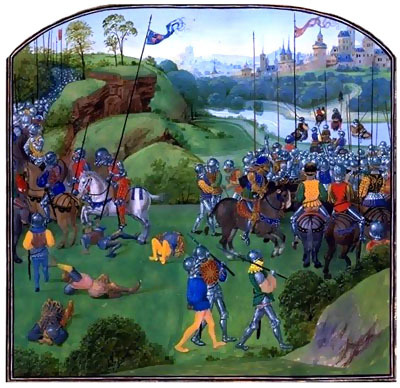 Battle of Radcot Bridge (saved from BerkshireHistory.com).
Battle of Radcot Bridge (saved from BerkshireHistory.com).Once the Appellants discovered that de Vere was putting together an army, the last two "junior" members came on board. Henry of Bolingbroke, Earl of Derby (son of John of Gaunt and the future Henry IV) posted himself at Radcot Bridge and succeeded in blocking de Vere from crossing the Thames; the royal army dispersed after a brief and pathetic battle and de Vere escaped over the Channel. Why did the non-political Bolingbroke join the Appellants? He later claimed he needed to protect this father's interests. It's also difficult to discover the motives of Thomas de Mowbray, Earl of Nottingham, 1st Duke of Norfolk (great-great grandson of Edward I and son-in-law to Arundel). He could have been driven by jealousy of Robert de Vere, who supplanted him in Richard's esteem. His early friendship with the king had definitely cooled, especially after he married Arundel's daughter; I imagine his father in-law put pressure on him to join the party of resistance. These last two Appellants tended to take a back seat, so to speak, and never wholeheartedly agreed with all the knavery that attended these trials. Nonetheless, they were committed and so the three became five.
 Beheading of Richard's Supporters from Froissart's Chronicles, BL-Harley4380 f. 193v.
Beheading of Richard's Supporters from Froissart's Chronicles, BL-Harley4380 f. 193v.From besieging the king in the Tower of London to the Merciless Parliament of 1388, the Lords Appellant pursued a bloody campaign against the king's supporters, culminating in the outrageous execution of Sir Simon Burley, Richard's vice-chamberlain and lifelong mentor. (By then they had gone way beyond their initial condemnations.) Bolingbroke and Mowbray publicly objected to Burley's conviction, as well as the Duke of York, Gloucester's brother; even Queen Anne got on her knees and begged Gloucester for Burley's life, to no avail. In the end, eight of Richard's supporters were executed—for no good reason. Three more fled to permanent exile, and over forty others were ejected from court (some returned later as Richard took back his authority). The king was reduced to a figurehead and withdrew to lick his wounds. For one year the three original Appellants tried to run the government their way (Bolingbroke and Mowbray had lost interest by then), but it soon became obvious that they were doing no better than before. Worse, actually: it was under their watch that the disastrous Battle of Otterburn was lost and Henry Hotspur taken prisoner along with his brother Ralph. Their ransom was a huge hit to the already depleted exchequer, which had been obliged to pay the Lords Appellant 20,000 pounds to reimburse them “for their great expenses in procuring the salvation of the realm and the destruction of the traitors”.
When Richard declared his majority in 1389, he was able to take over and dismiss his enemies without a protest. But, though Richard was obliged to "forgive and forget" on the surface, in reality his anger festered for ten years until he was strong enough to wreak revenge on the men who humiliated him. You can read all about the Lords Appellant and the Merciless Parliament in A KING UNDER SIEGE, Part One of The Plantagenet Legacy.
A King Under Siege Book 1 of The Plantagenet LegacyBy Mercedes Rochelle

Richard II found himself under siege not once, but twice in his minority. Crowned king at age ten, he was only fourteen when the Peasants' Revolt terrorized London. But he proved himself every bit the Plantagenet successor, facing Wat Tyler and the rebels when all seemed lost. Alas, his triumph was short-lived, and for the next ten years he struggled to assert himself against his uncles and increasingly hostile nobles. Just like in the days of his great-grandfather Edward II, vengeful magnates strove to separate him from his friends and advisors, and even threatened to depose him if he refused to do their bidding. The Lords Appellant, as they came to be known, purged the royal household with the help of the Merciless Parliament. They murdered his closest allies, leaving the King alone and defenseless; he would never forget his humiliation at the hands of his subjects. Richard's inability to protect his adherents would haunt him for the rest of his life, and he vowed that next time, retribution would be his.
Excerpt
But this wasn't the end of the matter. For three weeks the King refused to sign Burley's death warrant. In the meantime, controversy continued to go back and forth between the Commons and the Lords—all the Lords favoring Burley, that is. By now the discussions were about sparing the life of the accused. The Commons clamored for the death of Burley, deaf to any arguments which were uttered by those of all ranks, from the Duke of York all the way down to Richard's household clerks, willing to risk their necks to put in a good word for the vice-chamberlain.
Finally, after much hesitation, Henry Bolingbroke stood—to the amazement of the King and the wrath of Gloucester. After a moment, Mowbray stood with him. "My lords," Henry said, "I am of the opinion that Sir Simon Burley does not deserve the death penalty. By all means, remove him from the offices he now occupies. But do not debase yourself by this disgraceful verdict which reeks of partisanship." The last words had to come out at a shout, for before he had finished the members started hooting and booing at him. For some minutes he continued to holler at the crowd before giving up and sitting back down. He ignored Gloucester's furious glare.
The next morning, when the Appellants were sitting in the judges' chamber awaiting the beginning of Parliament, Gloucester couldn't restrain himself. "I cannot believe what you did," he spat at Bolingbroke who sat at the other end of the table. "You could have ruined everything we have worked for."
Henry casually picked an apple from a bowl. "Everything you have worked for. It would not be a great exaggeration to say I do not agree with your policy of extermination."
Gloucester stood, leaning over the table. "Don't you understand? If we let them live—even one of them—they will come back and destroy us!"
"Sit down uncle, please. If we pull their teeth, they cannot bite." Just to emphasize his statement, he took a bite out of the apple.
"As long as Richard lives, we are not safe unless we render him powerless."
"And thus we should prove ourselves more disgraceful, more ignoble than the King could ever be. No, my Lord, I do not fancy such a reputation."
"Henry, you are committed to this course of action. As are we all."
An uncomfortable pall fell over the room; they jumped when the door flew open and the queen entered, holding up the edge of her mantle. Richard was right behind her. Guiltily, the men stood. She gestured for them to sit. "No, my lords. It is I who must kneel to you." To their great dismay, Queen Anne fell to her knees before Gloucester. "My Lord, I beg you, with all my heart, to spare the life of Sir Simon Burley. Do not impose this terrible penalty."
Richard moved over to the fireplace, leaning against the mantle in disgust. He was clearly against this show of humility. But Anne didn't care. This was all her idea.
"Simon Burley was the man who brought me to England when I was just a frightened girl. He has been my staunch ally and my dearest friend. Please, I beg you. Do not take him from me." A tear ran down her cheek.
After his first astonishment, Gloucester turned away. She grabbed his hand, putting it against her wet face. "He is not the traitor you accuse him to be. He is loyal, and true. See how the King mourns." She kissed his hand, but he carefully withdrew it, trying not to insult her.
"Take pity, Lord Thomas. I beg you not to do this thing."
How Gloucester endured this woeful behavior was more than anyone in the room could fathom. The chroniclers were to state that she spent three hours on her knees, but how could that be possible? It was certainly long enough to be remembered throughout history, much to his discredit. After an uncomfortably long demonstration of her abject humiliation, he finally reached his limit. "You had best save your prayers for your husband," he said roughly, "for he stands in great need of them."
Stung by this remark, Richard came over and lifted the sobbing queen into his arms. "Have you no shame?" he retorted.
Still sitting, Gloucester turned to the King. "I will tell you this one last time. If you do not sign the warrants, you will face the same fate as Edward II. Do not take my warning lightly."
Richard looked in panic at Bolingbroke but his cousin was studying his fingernails. Why wouldn't he? Henry had nothing to gain from helping his beleaguered king.
Silently cursing his opponents, Richard whispered in Anne's ear. "Come from this terrible place."
The Coffee Pot Book Club★★★★★ Highly RecommendedRead the full review HERE!

Pick up your copy ofA King Under Siege Amazon UK • Amazon US
Mercedes Rochelle
 Born in St. Louis MO with a degree from University of Missouri, Mercedes Rochelle learned about living history as a re-enactor and has been enamored with historical fiction ever since. A move to New York to do research and two careers ensued, but writing fiction remains her primary vocation. She lives in Sergeantsville, NJ with her husband in a log home they had built themselves.
Born in St. Louis MO with a degree from University of Missouri, Mercedes Rochelle learned about living history as a re-enactor and has been enamored with historical fiction ever since. A move to New York to do research and two careers ensued, but writing fiction remains her primary vocation. She lives in Sergeantsville, NJ with her husband in a log home they had built themselves.Connect with Mercedes: Website • Blog • Facebook • Twitter
Published on August 20, 2019 21:00
August 19, 2019
Join Historical Romance author, Penny Hampson, as she takes a look at Life in the time of Philip Melvill, Esq, Lt Governor of Pendennis Castle #History @penny_hampson
Life in the time of Philip Melvill, Esq, Lt Governor of Pendennis CastleBy Penny Hampson
I came across Philip Melvill whilst researching the next story in my Gentlemenseries. Set in Falmouth, Cornwall, my story features Pendennis Castle, and I needed to know who was stationed there in 1810. I discovered someone who survived against great odds, accepted stoically what life threw at him, and overcame his physical limitations to improve the lives of others.
 Falmouth Harbour
Falmouth Harbour Pendennis Castle.
Pendennis Castle.Born in Dunbar in April 1762*, Philip Melvill was the fourth and youngest son of John Melvill, a Collector of the Customs, and a deeply religious man.
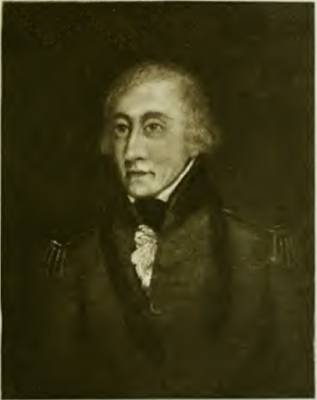 Portrait of captain Philip Melvill.
Portrait of captain Philip Melvill.At the age of sixteen Philip’s father purchased him a commission in the 73rd regiment, commanded by Lord Macleod. According to Philip’s memoirs, this choice of profession was based on his youthful desires for respect, to command others, and the appeal of ‘the noisy pomp and desultory habits of a military life.’ Described at this point in his life as ‘below the middle size’ but ‘regular and well proportioned’, he had ‘a remarkable sweetness of expression, and his manners were frank and courteous’. He sounds to be a very attractive young man.
His first task as an officer was to recruit a certain number of men to his regiment, which meant travelling round remote parts of Scotland for this purpose. Although he achieved his objective, this period exposed him alas, a mere youth of sixteen, to the temptations of drink. ‘It was usual to begin the morning with a dram, and the close of day seldom left the guest in possession of his reason and his senses.’ In other words, it seems he was on an extended pub crawl. Fortunately, this did not totally ruin him, but he admits that alcohol did leave its mark on both his health and morals.
After a brief return home, he rejoined his regiment at Elgin, and his moral principles were again put under strain. He found himself in ‘a society consisting chiefly of youths… unawed by the eye of authority, eager to assert their right to all the privileges of manhood… in such a society the most licentious spirit, even without the aid of a ready wit and an engaging address, will commonly have more influence to lead the weaker part astray, than the example of better conduct, in the well principled few, will have to preserve them.’
Melvill ignored his parents’ strictures about leading a moral life, and took up a life of idleness and dissipation.
After some time spent in training, Melvill was appointed to the light infantry, and in May 1778 he sailed with his regiment from Fort George to Portsmouth. The journey took fifteen days, causing them to miss the last of the season’s ships to the East Indies. They were ordered instead to Guernsey and Jersey, remaining there until the following December.
By March 1779, and now in Petersfield, Melvill and his company were again ready to depart for the East Indies, but this process was not without incident. Ordered to march to Portsmouth, one of the companies mutinied, almost resulting in a bloodbath, with the soldiers of one company ready to fire on their comrades in the mutinying troop. Fortunately, this was avoided and soon all returned to their duties. On 7th March the fleet finally set sail for the East Indies.
The long journey was not without problems — ill-discipline, and all the discomforts of living in very close quarters did not make for an easy passage. Arriving in warmer climates, an infectious disease known as jail-fever broke out, and Melvill was one of its victims. He was so ill that it was thought he would die. Fortunately, he recovered, and ten months after setting off from Portsmouth, he arrived in Madras, India.
At this time Madras was seething with resentment to colonial rule, but the British military rulers there ignored all warnings of impending trouble. ‘The Company’s treasury was exhausted; the army ill-paid, and ill-equipped; an extensive frontier unprovided with the means of defence, and our allies and dependent states depressed and disaffected’.
The expected uprising occurred in July 1780, with Hyder Ally, the ruler of Mysore, invading the Carnatic region, burning villages, and laying siege to British forts. On the morning of September 10th, Lieutenant Melvill and his company, under the command of Colonel Baillie, became engaged in an action against Hyder Ally… and this is when the course of Melvill’s life changed.
At the battle of Peranbancum, Hyder Ally’s forces broke through the British troops, inflicting many casualties, and forcing them to surrender. Melvill was one of those severely wounded. The first of his wounds caused the bone of his left arm to be shattered. A second ball passed through the same arm and part of his left breast. His company now overrun by the enemy, he received slashes to his right arm, severing the muscles, and was thrown to the ground. Stripped of his clothes, he was stabbed in the back with a spear, and left for dead.
‘Wounded and maimed I was left on the field of battle.… At this dreadful period of pain and destitution, I was lying naked on a bank of scorching sand, fainting from time to time with loss of blood, and from the severity of my wounds unable to move.’
For two days he lay in the searing heat until he was picked up by enemy soldiers, hoping to claim the ten rupee reward for bringing in a European alive to Hyder Ally’s camp. Held with one hundred and twenty-six fellow soldiers in a crowded tent, with no medical assistance, and under appalling conditions, the ordeal continued.
‘The wounded were crowded together in one tent, and mutually incommoded each other, so as to prevent a moment’s ease or rest.’
At this point Melvill attempted to take his own life, but did not have the physical strength to do so. After several days, he, and those prisoners who still survived, were conveyed to the fort of Bangalore. Here they were treated no better, but placed in chains, subjected to threats of torture and violent death, and denied any medical treatment.
‘Some were maimed and helpless. All medicine was denied, and it was very difficult to procure it clandestinely, under the strict prohibitions of introducing it which prevailed, and the danger of punishment if detected.’
This horrendous situation continued for four years, until March 1784, when, with the signing of the Treaty of Mangalore, Melvill and his fellow prisoners were at last released. Of their original number, only thirty survived.
Because of his poor health and the condition of his wounds, Melvill, although promoted to Captain, was unfit for active military duty. Instead, he went to stay with his elder brother who was living in Bengal, where he remained until 1786.
At last Melvill returned to England, and although still eager to serve his country, he was in no physical shape for active service, being unable to eat or dress unassisted, and often in great pain. But luck was on his side, and he was given the command of an invalid company stationed in Guernsey.
His good fortune didn’t end there. It was in Guernsey that he met the love of his life, Miss Elizabeth Dobree, and it wasn’t long before the pair were married. The couple remained on the island for five years, and it was there that Melvill started the good works that he became renowned for. Not only instilling military discipline amongst the soldiers in his charge, he also set up a school for their children, supplied it with books, and even taught them religious instruction.
 Portrait of Elizabeth Melvill.
Portrait of Elizabeth Melvill.After further spells of ill-health, and a return to the mainland as a retired captain on full pay, Melvill was offered the command of another invalid company stationed at Pendennis Castle. He was appointed Lieutenant Governor of Pendennis Castle and eventually formed the Pendennis Volunteer Artillery.
His new position was initially not an easy one. The troops under his command were ill-disciplined ‘habitual drunkenness, swearing, profanation of the Sabbath’ were commonplace. But Melvill, through his good works, changed all that. He got his men to build cottages for themselves and their families, laid out gardens on the slopes of the castle, ensured their religious instruction, and established schools both for the children of the garrison and in Falmouth. In 1807 he founded the Falmouth Misericordia Society ‘for the relief of poor strangers and distressed persons of the town,’ an organisation in operation until at least 1887.
His personal life was also not without its trials; he and Elizabeth had nine children, two of his sons pre-deceasing him at the young ages of nineteen and twelve years. Of his remaining sons, two joined the East India Company, one became a Church of England clergyman, and another followed his father into the army, becoming a Major General and awarded the KCB (Most Honourable Order of the Bath).
Philip Melvill, after a relatively short life of misfortune and atrocious ill-health, but unselfish and dedicated public service, died on 27 October 1811 at Pendennis Castle.The streets of Falmouth were lined with mourners at his funeral procession, keen to pay their respects to someone who had done so much for the life of their community.
* I have discovered that there is a discrepancy in the published secondary sources for Melvill’s date of birth. In The Melvill Family, a Roll of Honour of the Descendants of Captain Philip Melvill, Lieutenant Governor of Pendennis Castle, by Joubert de la Ferte, 1920, his birth year is given as 1760, while Susan E. Gay, gives his year of birth as 1762. The memorial to Philip Melvill in Falmouth Church states that he died in 1811 aged forty-nine years.
SourcesOld Falmouth, Susan E. Gay, London, 1903Memoirs of the Late Philip Melvill, Esq. Lieut. Gov. Of Pendennis Castle, Cornwall, London, 1812The Melvill Family, a Roll of Honour of the Descendants of Captain Philip Melvill, Lieutenant Governor of Pendennis Castle, by E. J. Joubert de la Ferté, 1920The Melvill Family and India, by David Williams, 2014 ( https://cpb-eu-w2.wpmucdn.com/blogs.ucl.ac.uk/dist/1/251/files/2014/05/Melvill-case-study-PDF-Final-19.08.14.pdf)
An Officer’s Vow(Gentlemen Book 2)By Penny Hampson
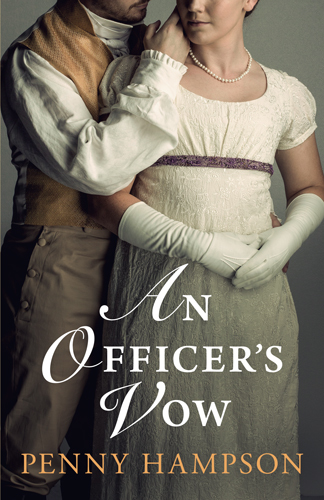
The future looks bleak to Major Nate Crawford. Depressed after being sent home from the Peninsular Campaign as unfit for service, he contemplates ending it all. Then an unexpected opportunity for adventure beckons in the shape of a delightfully intriguing runaway heiress. He will prove his worth as an officer and a gentleman by offering his help. He has a plan…
Lottie Benham is desperate. Her life is in danger and she needs a place of safety until her next birthday. The unexpected proposal from this attractive, but intimidating officer could be the answer to her prayers. Not normally a risk-taker, she decides to gamble all by placing her trust in this charismatic gentleman, who she suspects might be more in need of help than she.But the best laid plans…
Caught up in conflict, danger, and deception, will Lottie and Nate survive to find the perfect solution to their problems?
The Coffee Pot Book Club★★★★★ Highly RecommendedRead the full review HERE!

Pick up your copy of An Officer’s VowAmazon UK • Amazon US
Penny Hampson
 Having worked in various sectors before becoming a full time mum, Penny Hampson decided to follow her passion for history by studying with the Open University. She graduated with honours and went on to complete a post-graduate degree.
Having worked in various sectors before becoming a full time mum, Penny Hampson decided to follow her passion for history by studying with the Open University. She graduated with honours and went on to complete a post-graduate degree. Penny then landed her dream role, working in an environment where she was surrounded by rare books and historical manuscripts. Flash forward nineteen years, and the opportunity came along to indulge her other main passion – writing historical fiction. Encouraged by friends and family, three years later Penny published her debut novel A Gentleman’s Promise.
Penny lives with her family in Oxfordshire, and when she is not writing, she enjoys reading, walking, swimming, and the odd gin and tonic (not all at the same time).
Connect with Penny: Website • Twitter
Published on August 19, 2019 20:00
August 18, 2019
Now is your chance to vote for your favourite book cover for AUGUST over on The Coffee Pot Book Club! #BookCovers #CoffeePotBookClub #Competition
The Coffee Pot Book Club
Promoting Historical Fiction since 2015
Book Cover of the Month

Readers' Choice! August 2019
Now is your chance to vote for your favourite book cover for June. All you need to do is pop the number of the book cover you like along with the book title in the comment section at the bottom of the page.
The winner will be announced on the 28th August.
★ 1 ★
From Here to Fourteenth Street
By Diana Rubino

★ 2 ★
Across the Fourwinds
By Shane Trusz and Darryl Frayne

★ 3 ★
A Jewel in the Sands of Time
By Clive Mantle

★ 4 ★Clash of EmpiresBy Paul Bennett

★ 5 ★The Center of GravityBy Patricia Brandon

★ 6 ★In Satan’s ShadowBy John Anthony Miller

★ 7 ★The Copper RoadBy Richard Buxton

★ 8 ★
A Conspiracy of Wolves
By Candace Robb

★ 9 ★The Duchess of Gracechurch
Trilogy Box Set
By Catherine Kullmann

★ 10 ★Storytellers
By Bjørn Larssen

★ 11 ★
How to Catch a Wicked Viscount
By Amy Rose Bennett

★ 12 ★The Mercenary’s TaleBy April Munday

★ 13 ★The ApothecaryBy Joan Fallon

★ 14 ★Katharina FortitudeBy Margaret Skea

★ 15 ★Beneath a Stormy SkyBy AnneMarie Brear

★ 16 ★I Love to Hate YouBy Elizabeth Keysian

★ 17 ★Sauce for the GanderBy Jayne Davis

★ 18 ★An Officer's VowBy Penny Hampson

★ 19 ★A King Under SiegeBy Mercedes Rochelle

★ 20 ★A Tapestry of TreasonBy Anne O'Brien

★ 21 ★Divided EmpireBy Brian Kitchen

★ 22 ★Grave ExpectationsBy Heather Redmond

★ 23 ★The Bartered BodyBy J.R. Lindermuth

★ 24 ★Galileo's RevengeBy Christopher J T Lewis

★ 25 ★Madam FioccaBy Suzy Henderson

★ 26 ★Antonius: Son of RomeBy Brook Allen

★ 27 ★The Warrior With The Pierced Heart
By Chris Bishop

★ 28 ★
A Phoenix Rising
By Vivienne Brereton

Good Luck!
Published on August 18, 2019 23:14
#HistoricalFiction author, Jayne Davis, is taking a look at Prize money and the Royal Navy #History #Regency @jaynedavis142
Prize money and the Royal Navyby Jayne Davis
In Persuasion, Jane Austen’s Lieutenant Wentworth was considered an unsuitable match by Anne Elliot’s friend Lady Russell, as he was not rich nor did he have high family connections. Lady Russell persuaded Anne to end the engagement. Years later he returns as Captain Wentworth, considerably richer due to prize money, and that is where the novel starts.

What was prize money?
I have read one or two Regency novels where the author refers to an army officer becoming rich from prize money, but this was not the case (not for the British army, at least – it may have happened in other countries). In Britain, it applied to naval men only. What might be surprising is that every man on a ship received a share of any prize money to be had after an engagement, as did certain other people who may not have been involved at all.
Attention often focusses on the large and famous battles, such as Trafalgar, but many naval actions were small-scale: capturing an enemy frigate or sloop, or a merchantman. Prize money was intended to motivate sailors, and it certainly did.
Most prize money came from the sale of such merchant ships and their cargoes, although the sale could not take place until a Prize Court had assessed the capture and confirmed it was legitimate. For example, a captured merchantman from a neutral country would have to be returned to its owners. Lest this prize money encourage naval captains to concentrate their efforts on merchantmen instead of enemy warships (which is what they were supposed to be doing), ‘head money’ was paid for every sailor on board captured naval vessels. If in good condition, the Admiralty might buy a captured warship and use it, and the sale price became part of the prize money.
Frigates often operated alone or in small groups, and stood the best chance of capturing valuable prizes. Large warships like HMS Victory operated in fleets, and usually engaged other enemy fleets rather than chasing down merchantmen. The chances for winning prize money were much less than for crews of smaller vessels.
 The Battle of the Nile, 1798, where Nelson’s fleet defeated a French fleet. Although prize money would have been paid for the French ships destroyed, it also had to be shared out over a huge number of men, and the prizes would have been relatively small compared to something like a frigate capturing a merchantman loaded with cargo.
The Battle of the Nile, 1798, where Nelson’s fleet defeated a French fleet. Although prize money would have been paid for the French ships destroyed, it also had to be shared out over a huge number of men, and the prizes would have been relatively small compared to something like a frigate capturing a merchantman loaded with cargo.How was the money shared out?
The prize money from an action was shared out between all ships involved. Fair enough, you might say, if two frigates collaborated to capture a small convoy, then all on board both frigates should share the reward. However if another naval ship was in sight they, too, would take a share of the money even if they had taken no part in the action. The reasoning behind this was that the presence of that other ship (or ships) might encourage the enemy captain to surrender rather than continuing to fight—knowing that even if he defeated his current attackers, there were more to come and he would likely lose in the end.
If the ships involved were sailing under the command of a local Admiral (as opposed to sailing under direct orders from the Admiralty), that flag officer took 1/8 of the prize money.
Once a share of the prize money had been allocated to each ship involved in an action, it was further divided between members of the crew. Ignoring the Flag Officer’s 1/8th:
1/4 to the Captain1/8 shared between the Master and Lieutenants, Captain of Marines, Surgeon1/8 shared between Lieutenants of Marines, Principal Warrant Officers1/8 shared between Midshipmen, other Warrant Officers, Sergeants of Marines1/4 to everyone else
Within these groups of people, the money was not shared equally. For example, able seaman (the most highly trained/skilled) got more than ordinary seamen, who in turn got more than landmen.
The actual sharing out of the prize money was done by prize agents, who often hung onto the money for some years (accruing interest), to the frustration of the intended recipients.
An interesting snippet that I came across while researching for this post was that the prize was property that belonged to the whole crew. For example, a frigate might capture a small merchantman that the captain didn’t consider worth the loss of manpower to take back to Britain. He could confiscate and sell the cargo, and sell the ship back to its owners – but only if the majority of the crew agreed with this course of action.

HMS Blanche towing la Pique, a French prize.The tactical situation might not always allow a prize to be delivered to a suitable port.
How much was it worth?
This blog post includes a table of the pay of officers and warrant officers. An able seaman would earn around 24 shillings a month, an ordinary seaman 19 shillings, and a landman 18 shillings. Deductions were made for contributions to the Greenwich Hospital and the Chatham Chest (which provided pensions for the ‘sick and hurt’), amounting to around 1s 6d per month.
The naval ‘month’ was the lunar month, so there were 13 months in a year (they weren’t actually paid monthly, but that is for a different post). After deductions the above becomes annual pay of £14 12 s 6d for an able seaman, down to £10 13s 2d for a landman. In the mid 19th Century these were good wages compared to agricultural workers, but inflation in the latter part of the century (and no naval pay rises) gradually changed this situation. This was one of the factors that caused the mutinies in 1797, after which pay was increased.
I haven’t been able to find average amounts of prize money; the example that always seems to be quoted is the capture of two Spanish frigates by four British frigates in 1799. The Spanish ships were carrying a valuable cargo, resulting in one of the largest prize money payouts ever made – a total of nearly £620,000. Each captain gained over £40,000, each seaman £182 (many times their yearly pay).
 HMS Ethalion in pursuit of the Thetis – two of the six ships involved in the action described above.
HMS Ethalion in pursuit of the Thetis – two of the six ships involved in the action described above.Most price money payments would be far less than this, but even £20 would be more than a year’s wages for an able seaman.
Sauce for the GanderBy Jayne Davis

A duel. An ultimatum. An arranged marriage.
England, 1777
William Stanlake, Viscount Wingrave, whiles away his time gambling and having affairs, thwarted in his wish to serve his country by his controlling father. Then a deceived husband and a challenge to a duel change everything.
Constance Charters is an unwanted daughter, relegated to keeping house for her impoverished but socially ambitious father. When the Earl of Marstone wants a bride at short notice for his errant son, her father eagerly accepts the match. But Connie wants a husband who will respect her for herself, not an idle profligate.
Both are coerced into the marriage, but their new home holds unexpected dangers. Can they overcome the forces against them and forge the lives they want for themselves?
Sauce for the Gander is the first book in the Marstone Series--a set of standalone stories with some characters in common. Each book is a complete story with no major cliffhangers, although there might sometimes be a minor plot thread to be resolved in a later book.
Pick up your copy ofSauce for the GanderAmazonOr, read for FREE with

Jayne Davis
 Jayne Davis writes historical romances set in the late Georgian/Regency era, published as both ebooks and paperbacks.She was hooked on Jane Austen and Georgette Heyer as a teenager, and longed to write similar novels herself. Real life intervened, and she had several careers, including as a non-fiction author under another name. That wasn't quite the writing career she had in mind...Finally, she got around to polishing up stories written for her own amusement in long winter evenings, and became the kind of author she’d dreamed of in her teens. She is now working on the first few books in the Marstone Series, set in the late Georgian/early Regency period.
Jayne Davis writes historical romances set in the late Georgian/Regency era, published as both ebooks and paperbacks.She was hooked on Jane Austen and Georgette Heyer as a teenager, and longed to write similar novels herself. Real life intervened, and she had several careers, including as a non-fiction author under another name. That wasn't quite the writing career she had in mind...Finally, she got around to polishing up stories written for her own amusement in long winter evenings, and became the kind of author she’d dreamed of in her teens. She is now working on the first few books in the Marstone Series, set in the late Georgian/early Regency period.Connect with Jayne: Website • Facebook • Twitter • Pinterest • Goodreads.
References
N A M Rodger, The Wooden World.Nelson and His Navy – Prize Money, The Historical Maritime
Image rightsAll ship paintings – Wikimedia commonshttps://commons.wikimedia.org/wiki/File:Ethalion_with_Thetis.jpeghttps://commons.wikimedia.org/wiki/File:Battle_of_the_Nile,_Whitcombe2.jpghttps://commons.wikimedia.org/wiki/File:HMS_Blanche_and_Pique.jpgHeader image – flag and coins bought from Deposit photos under subscription arrangement, ship is one of the paintings above.
Published on August 18, 2019 20:00
August 16, 2019
Book Review — The Warrior With The Pierced Heart: The Shadow of the Raven: Book 2 by Chris Bishop #HistoricalFiction #AngloSaxon @CBishop_author

The Warrior With The Pierced HeartThe Shadow of the Raven: Book 2By Chris Bishop

In the second book in the exciting and atmospheric Shadow of the Raven series we rejoin novice monk turned warrior, Matthew as he marches ahead of King Alfred, to Exeter to herald the King's triumphant return to the city, marking his great victory at Edington.
It should have been a journey of just five or perhaps six days but, as Matthew is to find to his cost, in life the road you're given to travel is seldom what you wish for and never what you expect.
In this much-anticipated sequel Chris Bishop again deposits the reader slap-bang into the middle of Saxon Britain, where battles rage and life is cheap. An early confrontation leaves Matthew wounded, but found and tended by a woodland-dwelling healer he survives, albeit with the warning that the damage to his heart will eventually take his life.
Matthew faces many challenges as he battles to make his way back to Chippenham to be reunited with King Alfred and also with the woman he wants to make his wife. This is an epic tale of triumph over adversity as we will the warrior with the pierced heart to make it back to those he loves, before it is too late.

“In life the road you’re given to travel is seldom what you wish for — and never what you expect…”
Matthew was tasked with riding on ahead of King Alfred’s army to announce his imminent arrival in Exeter. Matthew knew the risks of going through the forest, but speed was of the utmost importance, and therefore, the risk, he considered, was worth taking.
But as Matthew lies on the forest floor, with an arrow in his heart, he knows that not only did he make a mistake, but that he will never see Exeter yet alone King Alfred again. There is nothing left for him to do except listen to the desperate battle and the cries of his men as they succumbed to a Viking ambush. He can only pray that the Vikings will allow him to die quickly. However, the Vikings take delight in misery, and they are not known for their mercy.
As bleak as it might be, God, fate, whatever you want to call it, has not finished with Matthew yet. Nursed back to health by a Celtic healer, Matthew must confront an even bigger challenge, one in which new friendships will be forged, and enemies faced.
Will the Warrior With The Pierced Heart, be victorious, or will his enemies vanquish him, once and for all?
Brutal beginnings can only lead to unmerciful ends, and there are those aplenty in The Warrior With The Pierced Heart: The Shadow of the Raven Book #2 by Chris Bishop. This book is not for the faint-hearted. Bishop throws his readers straight back into the action, and the story begins with a slaughter. This fast-paced narrative continues throughout the course of this book. There is hardly a moment to catch one’s breath as the story continues to pick up momentum. The more I read, the more immersed I became in the story and the characters that graced the pages.
Like before, in Book 1 of The Shadow of the Raven, I simply adored Matthew. He has grown spiritually as well as worldly. Matthew has tasted defeat. He has danced with death, and yet through it all, his still-beating heart dares to hope. Matthew is a protagonist that readers can really get behind. He is not only brave and honourable, but he also makes mistakes, and I think that is what makes him so appealing. Matthew finds himself fighting for not only his own life but for those around him. He is appalled by the atrocities he witnesses, and he desperately desires to help, even when there is nothing he can do. Matthew is a character who is continuously conflicted. The things he has done, the things he has seen leave their mark, which I thought made him very human in the telling.
Bishop has introduced several new characters into the story. I thoroughly enjoyed reading about Aelred and Brother Benedict as they try to help Matthew on his journey.
The antagonists are once again the Vikings, in particular, some slavers, who are vile and cruel, but they are not the only ones. The people who Matthew fought at Edington to protect, turn their back on him because of superstition. He has come back from the dead and therefore must be in league with the Devil. This, I thought, was wonderfully insightful. Christianity was the religion of King Alfred and therefore his people, but the religion of their forefathers still had a hold on them, and this made things far more difficult for Matthew than they needed to be, and it makes absolute sense for Bishop to have written these scenes this way.
The breathtaking historical accuracy of this book has to be commended. Reading The Warrior With The Pierced Heart was like stepping through time. I found myself in this foreign yet strangely familiar world that we call The Dark Ages. I thought the Dark Ages was masterfully portrayed and as historically accurate as the surviving sources allow it to be.
Not only does Bishop excel at writing vivid battle scenes, but he also demonstrates the hardship of everyday life and how dangerous it was to live during this time. If you like your fiction battle-heavy, then The Shadow of the Raven series would undoubtedly appeal.
I Highly Recommend.
Review by Mary Anne Yarde.The Coffee Pot Book Club.
Pick up your copy ofThe Warrior with a Pierced HeartAmazon UK • Amazon US
Chris Bishop
 Chris Bishop was born in London in 1951. After a successful career as a Chartered Surveyor, he retired to concentrate on writing, combining this with his lifelong interest in history. His first Novel, Blood and Destiny, was published in 2017 and his second, The Warrior with the Pierced Heart was released in July 2018. Both form part of a series entitled The Shadow of the Raven.
Chris Bishop was born in London in 1951. After a successful career as a Chartered Surveyor, he retired to concentrate on writing, combining this with his lifelong interest in history. His first Novel, Blood and Destiny, was published in 2017 and his second, The Warrior with the Pierced Heart was released in July 2018. Both form part of a series entitled The Shadow of the Raven.Chris is a member of the Historical Writers’ Association as well as the Historical Novel Society.
Connect with Chris: Website • Blog • Twitter • Goodreads.
Published on August 16, 2019 20:00
The Coffee Pot Book Club
The Coffee Pot Book Club (formally Myths, Legends, Books, and Coffee Pots) was founded in 2015. Our goal was to create a platform that would help Historical Fiction, Historical Romance and Historical
The Coffee Pot Book Club (formally Myths, Legends, Books, and Coffee Pots) was founded in 2015. Our goal was to create a platform that would help Historical Fiction, Historical Romance and Historical Fantasy authors promote their books and find that sometimes elusive audience. The Coffee Pot Book Club soon became the place for readers to meet new authors (both traditionally published and independently) and discover their fabulous books.
...more
...more
- Mary Anne Yarde's profile
- 159 followers



